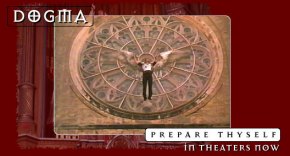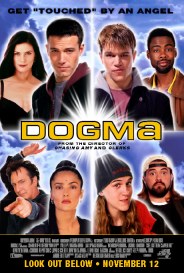 Dogma
(1999)
Dogma
(1999) Dogma
(1999)
Dogma
(1999)
Starring Linda Fiorentino, Ben Affleck, Matt Damon, Chris Rock, Alan
Rickman, Salma Hayek, Jason Lee, George Carlin, Alanis Morissette.
Written and directed by Kevin Smith.
Grade: B-
Review by Jeff Vorndam.
Brilliant anarchic visionary romp or talky overlong juvenile cesspool? Dogma is a little of both, full of Kevin Smith’s excesses, many of which are forgivable and desired. It’s spottily hilarious–not as constantly funny as Clerks. It’s also not the damning critique of Catholicism many people are expecting. It is irreverent but not blasphemous. Smith never questions God’s existence, only the methods by which it’s purveyed and consumed. It is a zealous and sloppy film in execution, one that could have gone under the editing knife a little more, but then we wouldn’t have the Shit Demon, would we?
Oops, I’m getting ahead of myself. Dogma begins, as all devout films do these days (see The Last Temptation of Christ), with a disclaimer. Unlike Scorsese’s opening message, Smith’s disclaimer is a joke–maybe even an apology. As a director who’s already publicly apologized for Mallrats, Smith steals the thunder of critics by calling Dogma a “trifle” that is not to be taken seriously. This is the exact opposite of Steve Soderbergh’s recent Schizopolis, which begins with a bold announcement that the following film is the most important film of our time, and if people don’t understand it, that’s their fault. I thought Soderbergh’s use was funny, and Smith’s is a hale re-spin that promised two hours of hilarity. Unfortunately, the rest of the film doesn’t live up to the prologue.
The plot doesn’t make much sense, but then again, does the plot of any of the
escapades in the Bible make much sense? Linda Fiorentino is Bethany (note resemblance
to Bethlehem), a Catholic who attends church every week but feels spiritually
dead inside. She also works at an abortion clinic. One of the good things about
Dogma is that it depicts what may be the largest religious sect in North
America–the lapsed Catholic. Why are there so many people who have parted ways
from the Church of their upbringing? Being told every week that you’ll go to
hell if you have an abortion might have something to do with it for some people.
Bethany is dubious, to say the least, when the voice of God, a.k.a. Metatron
(Alan Rickman), appears in her bedroom one night en el fuego. Metatron
tells Bethany that she has been chosen by God to be the Last Scion–a savior
of mankind. You see, two renegade angels, Bartleby (Ben Affleck) and Loki (Matt
Damon), having endured banishment to Wisconsin for thousands of years, have
discovered a loophole in Catholic doctrine that will allow them reentry into
Heaven.  By
exercising the loophole, the angels will have proved God fallible and all of
existence will be negated. These are fairly high stakes, and Bethany shoulders
them with reasonably good humor. Never mind that no one wonders why a fallible
deity predicates an undoing of creation.
By
exercising the loophole, the angels will have proved God fallible and all of
existence will be negated. These are fairly high stakes, and Bethany shoulders
them with reasonably good humor. Never mind that no one wonders why a fallible
deity predicates an undoing of creation.
The loophole Bartleby and Loki are exploiting is the Catholic practice of plenary indulgence, a remission of temporal punishment due for sin. (For more on indulgences, see here.) When granted improperly or superfluously, the indulgence can absolve the impious of their sins. Bartleby and Loki are impious, and Cardinal Glick (George Carlin) is certainly dispensing indulgences illicitly. Glick’s reasoning is that indulgences are a hook to bring back wayward followers to his revamped “Catholicism Wow!” program. All Bartleby and Loki need to do is trek over to New Jersey, the hallowed ground of all of Kevin Smith’s films, and be there at the church when Glick wipes the slate clean for them.
Bethany’s mission is stop these two from passing through the church that day. How does one mortal stop two avenging angels? With lots of help–in the form of prophets Jay and Silent Bob (Jason Mewes and Kevin Smith), the forgotten 13th Apostle Rufus (Chris Rock), and the muse Serendipity (Salma Hayek). The help this entourage provides is debatable. Jay and Silent Bob, the recurring duo in all of Smith’s films, have greatly expanded roles in this movie but don’t expand their shtick beyond Jay’s usual sex/weed fixation and Silent Bob’s googly-eyed mugging. That’s not necessarily a bad thing, as many of the funniest lines in the movie belong to Jay. Less funny, and more shtick-driven, is Rufus. Predictably, he gets to rant about the omission of the black man in the Bible, particularly himself as the 13th Apostle. (On a nitpicky Catholic note, I should mention that he would more accurately be called the 13th Disciple, as the 12 Disciples were a subset of Christ’s Apostles.) One thing is for sure, Smith knows how to give his characters an introduction. Rufus makes a dramatic entrance, and no less brazen is the muse Serendipity’s as a stripper. What follows is the most unnecessary scene in the movie, which seems to serve only two purposes: 1) to pay homage to John Hughes’ Weird Science, and 2) to give Smith staple Ethan Suplee a role in the film. Yes, this is the scene with the Golgothan (a.k.a. the Shit Demon). If you found the Fat Bastard character uproarious in Austin Powers 2 (I didn’t), you’ll probably enjoy this part.
Once the Golgothan is dispatched, we get to the real purpose of these extra characters brought to help Bethany. Plot exposition! Fiorentino spends most of the movie asking questions and Rock and Hayek provide answers. Kevin Smith used to write great dialogue that leapt from the page. Now he writes parodies of conversations. Characters fly through voluminous blocks of words that never seem part of a real dialogue but more like a script being read aloud. Occasionally, these words are very funny but the delivery is so clunky that the humor is more forced than in Smith’s previous outings. The duo that can handle these wordy diatribes is Affleck and Damon. Their scenes work better because they have a well-established rhythm, and they’re good actors. Their character arcs are confusing, though. The story leads us to believe that Loki (Damon) is the hothead and the more eager to seek revenge, while Bartleby (Affleck) has misgivings. In the second half of the movie there is an unexplained switch in philosophies between the two. By movie’s end, Bartleby is the strident one and Loki the doubter.
You may be wondering, where is God all this time? In a lame side-plot that is never as funny as I expected, given the side-splitting antics of Jason Lee in earlier Kevin Smith films, Lee plays Azrael, another fallen angel who prefers the nullification of existence to his torment in Hell. He’s kidnapped God (one might wonder: if he can do this, why all the other rigmarole?). It isn’t until the end, and a literal case of deus ex machina, that God sets things right.
Dogma’s message is implicit in its title. It’s a frustrated tweaking of the Church (“pulling the Church’s pigtails,” I think Smith described it) and its staid doctrines. The rigidity and unyieldingly formidable system of the Catholic religion stifles rather than encourages love of God. Smith, like most people born after the Vatican II overhaul, is considerably more relativistic in his world-view. Beliefs are too strong, ideas are more useful. Ideas can adapt and accept. Beliefs cause war and separation. There are so many Christian denominations because so many people got fed up with a code that didn’t relate to their particular needs. This message comes through rather well in Dogma, partly because Smith’s juvenile and crass comedy softens the heavy-handedness a message film imports.
Dogma gets a strong B- because it is uneven. Much of the humor falls flat, and Smith’s visional style is functional at best. It is an original film though, and its heart is in the right place. I think it also may improve with successive viewings, as a lot of the humor is in the details (look for the box of Post Hosties in Glick’s office) and in-jokes (Matt and Ben’s sexual orientation is questioned). My impression after one viewing, though, is that someone is giving Kevin Smith much too much money to play around with, and the strained financial conditions when he made Clerks and Chasing Amy produced better results.
Review © November 1999 by AboutFilm.Com
and the author
Images © 1999 Lions Gate Films. All Rights Reserved.
|
Send us a comment
on this review. |
 |